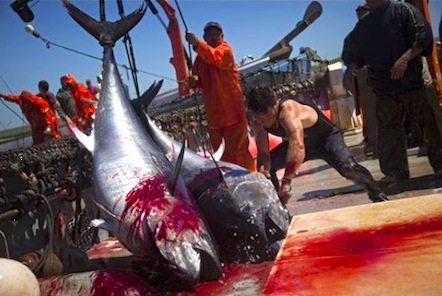Right now, California is in the news for its upcoming ban of foie gras. But of all the controversial foods on the market, why does foie gras get the focus of protest and anger? Most of the chefs serving foie on their menus are not only aware of the practices involved in producing it, but actively seek out humane, sustainably raised foie farms. This attention typically falls across the entire menu, promoting local, sustainable, and humane purchases throughout their entire business. As
Paula Wolfert smartly points out "I'd rather be a force-fed duck than a Tyson chicken.''
The Huffington Post recently published a story highlighting 8 other foods that deserve the angry mob's attention before foie gras. For reasons of scale, sustainability, and far worse animal treatment (reread Paula's comment above) the Huffington Post argues these ingredients deserve the attention first. I won't argue that everything below should be banned, though I'd support an end to a few of them (e.g. shark fin harvesting). More importantly, I see hypocrisy in the attention and devotion for the anti-foie movement when there are so many other more important food afflictions happening daily.

Bluefin Tuna
Bluefin might be the most widely-cited example of overfishing. They are caught way above the allowed quota with minimal recovery allowed for the stock.
Shark Fin
As we've discussed on this site, the practice of sourcing shark fin is not only disgusting and cruel, but it is bad for the ocean's health. To be fair in this editorial, shark fin
is getting more attention these days and will be outlawed in California as well.
Palm Oil
Palm oil production is devastating rain forests and the animals that live within them. The Girl Scouts have pledged to use less of it in their cookies, but that's "only a drop in the bucket."
Farmed Salmon
After accounting for concerns such as sea lice and other diseases within the densely populated salmon farms, consumers should know that these ailments are spilling into the wild stocks of fish now.
Coffee and Chocolate without Fair Trade Practices
Much of the world's coffee and chocolate is produced by mistreated and exploited workers in poor countries. Fair trade practices are working towards a solution, though they bring a new set of issues for the local cultures to deal with (often greater economic inequalities inside those countries).
Feedlot Cattle
Mass produced, grain fed beef has three big concerns: environmental (rainforests cut down, effluence to deal with, etc.), animal treatment (overcrowding, abuse), and human (raised e.coli concerns, human labor conditions).
Junk Food Marketed to Children
This one's hard to argue with as well. If you haven't read it, pick up a copy of
Fast Food Nation.
Factory Farmed Chicken
Referring to Paula's quote yet again, if you've ever been to a large scale poultry operation then you've been disgusted by the conditions for both the animals and the people working there. Contrast this setting with a humane foie gras farm and the whole debate can feel superficial.
Source:
Huffington Post